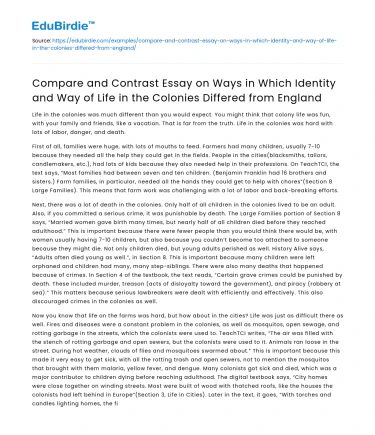Life in the colonies was much different than you would expect. You might think that colony life was fun, with your family and friends, like a vacation. That is far from the truth. Life in the colonies was hard with lots of labor, danger, and death.
First of all, families were huge, with lots of mouths to feed. Farmers had many children, usually 7-10 because they needed all the help they could get in the fields. People in the cities(blacksmiths, tailors, candlemakers, etc.), had lots of kids because they also needed help in their professions. On TeachTCI, the text says, “Most families had between seven and ten children. (Benjamin Franklin had 16 brothers and sisters.) Farm families, in particular, needed all the hands they could get to help with chores”(Section 8 Large Families). This means that farm work was challenging with a lot of labor and back-breaking efforts.
Save your time!
We can take care of your essay
- Proper editing and formatting
- Free revision, title page, and bibliography
- Flexible prices and money-back guarantee
Next, there was a lot of death in the colonies. Only half of all children in the colonies lived to be an adult. Also, if you committed a serious crime, it was punishable by death. The Large Families portion of Section 8 says, “Married women gave birth many times, but nearly half of all children died before they reached adulthood.” This is important because there were fewer people than you would think there would be, with women usually having 7-10 children, but also because you couldn’t become too attached to someone because they might die. Not only children died, but young adults perished as well. History Alive says, “Adults often died young as well.”, in Section 8. This is important because many children were left orphaned and children had many, many step-siblings. There were also many deaths that happened because of crimes. In Section 4 of the textbook, the text reads, “Certain grave crimes could be punished by death. These included murder, treason (acts of disloyalty toward the government), and piracy (robbery at sea).” This matters because serious lawbreakers were dealt with efficiently and effectively. This also discouraged crimes in the colonies as well.
Now you know that life on the farms was hard, but how about in the cities? Life was just as difficult there as well. Fires and diseases were a constant problem in the colonies, as well as mosquitos, open sewage, and rotting garbage in the streets, which the colonists were used to. TeachTCI writes, “The air was filled with the stench of rotting garbage and open sewers, but the colonists were used to it. Animals ran loose in the street. During hot weather, clouds of flies and mosquitoes swarmed about.” This is important because this made it very easy to get sick, with all the rotting trash and open sewers, not to mention the mosquitos that brought with them malaria, yellow fever, and dengue. Many colonists got sick and died, which was a major contributor to children dying before reaching adulthood. The digital textbook says, “City homes were close together on winding streets. Most were built of wood with thatched roofs, like the houses the colonists had left behind in Europe”(Section 3, Life in Cities). Later in the text, it goes, “With torches and candles lighting homes, the fire was a constant danger”(Section 3, Life in Cities). This is crucial because not only were the houses compacted together and made out of wood, but the colonists used torches and candles to light their homes. Fires became a regular threat to safety issues, so towns formed bucket brigades to put out fires. Every house had a bucket hanging over the front door, so that if anyone yelled, “FIRE!!!”, you could grab your bucket and join the line to put out the fire.
As you can now see, life for the colonists was dangerous and weary. It was not what you would expect with fun trips and sightseeing. Living in the colonies wasn’t easy and took a lot of work to survive.






 Stuck on your essay?
Stuck on your essay?

